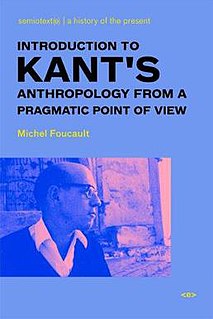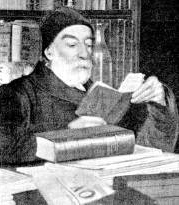 W
WKantianism is the philosophy of Immanuel Kant, a German philosopher born in Königsberg, Prussia. The term Kantianism or Kantian is sometimes also used to describe contemporary positions in philosophy of mind, epistemology, and ethics.
 W
WThe categorical imperative is the central philosophical concept in the deontological moral philosophy of Immanuel Kant. Introduced in Kant's 1785 Groundwork of the Metaphysic of Morals, it may be defined as a way of evaluating motivations for action.
 W
WIn Kant's philosophy, a category is a pure concept of the understanding (Verstand). A Kantian category is a characteristic of the appearance of any object in general, before it has been experienced. Following Aristotle, Kant uses the term 'categories' to describe the "pure concepts of the understanding, which apply to objects of intuition in general a priori…" Kant further wrote about the categories: "They are concepts of an object in general, by means of which its intuition is regarded as determined with regard to one of the logical functions for judgments." Such a category is not a classificatory division, as the word is commonly used. It is, instead, the condition of the possibility of objects in general, that is, objects as such, any and all objects, not specific objects in particular. Kant enumerated twelve distinct but thematically related categories.
 W
WThe critical philosophy movement, attributed to Immanuel Kant (1724–1802), sees the primary task of philosophy as criticism rather than justification of knowledge. Criticism, for Kant, meant judging as to the possibilities of knowledge before advancing to knowledge itself. The basic task of philosophers, according to this view, is not to establish and demonstrate theories about reality, but rather to subject all theories—including those about philosophy itself—to critical review, and measure their validity by how well they withstand criticism.
 W
WGeorg Wilhelm Friedrich Hegel was a German philosopher and the most important figure in German idealism. He is considered one of the fundamental figures of modern Western philosophy, with his influence extending to the entire range of contemporary philosophical issues, from aesthetics to ontology to politics, both in the analytic and continental tradition.
 W
WA hypothetical imperative is originally introduced in the philosophical writings of Immanuel Kant. This sort of imperative is contrasted with a categorical imperative.
 W
WIntroduction to Kant's Anthropology is an introductory essay to Michel Foucault's translation of Immanuel Kant's 1798 book Anthropology from a Pragmatic Point of View — a textbook deriving from lectures he delivered annually between 1772/73 and 1795/96. Both works together served as his secondary thesis, although Foucault's translation of the Anthropology was published separately by Vrin in 1964. The introduction was published in an English translation by Arianna Bove on generation-online.org in 2003.
 W
WKantian ethics refers to a deontological ethical theory developed by German philosopher Immanuel Kant that is based on the notion that: "It is impossible to think of anything at all in the world, or indeed even beyond it, that could be considered good without limitation except a good will." The theory was developed as a result of Enlightenment rationalism, stating that an action can only be good if its maxim—the principle behind it—is duty to the moral law, and arises from a sense of duty in the actor.
 W
WAnalytical psychology is a term coined by Carl Jung, a Swiss psychiatrist, to describe research into his new "empirical science" of the psyche. It was designed to distinguish it from Freud's psychoanalytic theories as their seven year collaboration on psychoanalysis was drawing to an end between 1912 and 1913. The evolution of his science is contained in his monumental opus, the Collected Works, written over sixty years of his lifetime.
 W
WImmanuel Kant was a German philosopher and one of the central Enlightenment thinkers. Kant's comprehensive and systematic works in epistemology, metaphysics, ethics, and aesthetics have made him one of the most influential figures in modern Western philosophy.
 W
WThe Kingdom of Ends is a thought experiment centered on the moral philosophy of Immanuel Kant. Kant introduced the concept in his Groundwork of the Metaphysic of Morals (4:439). The thought experiment proposes a world in which all human beings are treated as ends, not as mere means to an end for other people.
 W
WSalomon Maimon was a philosopher born of Lithuanian Jewish parentage in the Grand Duchy of Lithuania, present-day Belarus. Some of his work was written in the German language.
 W
WIn late modern continental philosophy, neo-Kantianism was a revival of the 18th-century philosophy of Immanuel Kant. More specifically, it was influenced by Arthur Schopenhauer's critique of the Kantian philosophy in his work The World as Will and Representation (1818), as well as by other post-Kantian philosophers such as Jakob Friedrich Fries and Johann Friedrich Herbart.
 W
WPoor Dionis or Poor Dionysus is an 1872 prose work by Romanian poet Mihai Eminescu, classified by scholars as either a novel, a novella or a modern fairy tale. It is a liberal interpretation of contemporary German philosophy and ancient motifs, discussing themes such as time travel and reincarnation through the lens of post-Kantian idealism. Its eponymous central character, a daydreaming scholar, moves between selves over time and space, between his miserable home, his earlier existence as a monk in 15th-century Moldavia, and his higher-level existence as a celestial Zoroaster.
 W
WCharles Bernard Renouvier was a French philosopher. He considered himself a "Swedenborg of history" who sought to update the philosophy of Kantian liberalism and individualism for the socio-economic realities of the late nineteenth century, and influenced the sociological method of Émile Durkheim.
 W
WIn Kantian philosophy, a transcendental schema is the procedural rule by which a category or pure, non-empirical concept is associated with a sense impression. A private, subjective intuition is thereby discursively thought to be a representation of an external object. Transcendental schemata are supposedly produced by the imagination in relation to time.
 W
WTranscendental idealism is a doctrine founded by German philosopher Immanuel Kant in the 18th century. Kant's doctrine is found throughout his Critique of Pure Reason (1781). Kant argues that the conscious subject cognizes the objects of experience not as they are in themselves, but only the way they appear to us under the conditions of our sensibility. Thus Kant's doctrine restricts the scope of our cognition to appearances given to our sensibility and denies that we can possess cognition of things as they are in themselves, i.e. things as they are independently of how we experience them through our cognitive faculties.